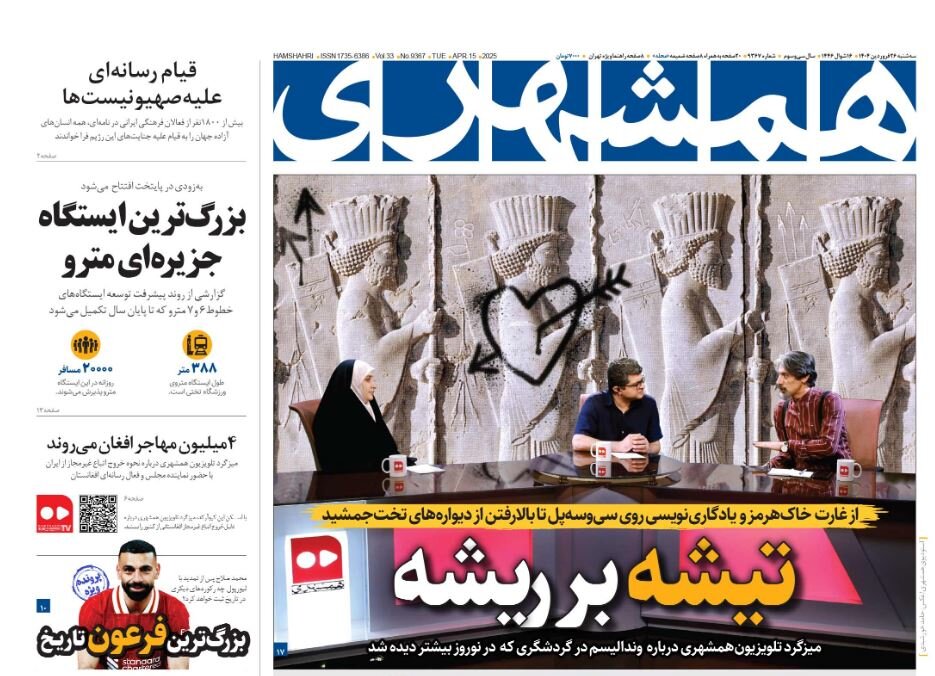Tehran – In commentary, Hamshali dealt with the process of nuclear negotiations between Iran and the United States.
It wrote: On Saturday (April 12th), three years later, Iran and the US met in Muscat, exchanging serious views on solving the nuclear issue. These negotiations are underway, and the JCPOA and the US parties agree that the 2015 nuclear agreement cannot be implemented in its current form. Ali Akbar Salehi, former chief of Iran’s atomic energy organization, said the global situation is becoming more complicated, with unpredictable people like Netanyahu, who fail to comply with international and global regulations and could disrupt work at any time. Therefore, we should not postpone the hassle of negotiations either. In other words, we should not think that we have a lot of time and will delay work. We need to take the middle ground and also consider the issues in an integrated way along with regional and global issues.
Ettelaat: The terms of the agreement between Iran and the US are ripe
In an interview with international relations expert Abdolreza Faraji Rad, Ettelaat discussed the form of negotiations between Iran and the US. He said: Iran’s reasons for indirect negotiations with the United States are rooted in a distrust of American commitment to their promises. In fact, the Islamic Republic wants to know what Americans are looking for in negotiations. As the atmosphere of the first round of negotiations has become positive, negotiations can change from “indirect to direct.” Current observations and Iranian and US actions show that the terms of the agreement that can be mentioned are ripe. The first reason is that Iran must be active to prevent the activation of the snapback mechanism. The second reason is that both Iran and the United States avoid war as much as they need to understand and reach a common understanding. Negotiations are so important in the current situation that Iran is ready to make some concessions to the US. The current situation between Iran and the United States has been unprecedented for the past half century. Therefore, the probability of possible agreements is very high.
Donya-e-eqtesad: Seeking constructive recognition
In the memo, Donya Ektesad worked to welcome the Persian Gulf Cooperation Council to Iran and the US consultations, saying: The Persian Gulf Cooperation Council seeks to develop relations with both sides of the conflict in a state of cooperation and convergence. The Persian Gulf Arab countries have been regional ally of the United States for decades. Recognizing the structural conflict between Iran and the Persian Gulf Cooperation Council, the Arab bloc is seeking to change its outlook and prioritize its political and economics by publishing its economic vision and ending a long-term conflict with Iran. From this perspective, they don’t want to be part of the maximum pressure project on Iran, and they don’t become part of this campaign. Instead, they move towards mediation between Iran and Trump’s America.
Etemad: Pre-contract results
Etemad spoke with senior political analyst Mashala Shams Al Waegin about the outcome of Saturday’s negotiations between Iran and the United States. He said: The agreement has already been achieved because Iran does not seek nuclear weapons and the highlight of the US demand is nuclear weapons. He said that in the circumstances Trump has announced in his letter, it is sufficient for him to have no access to nuclear weapons, and, according to leadership strategy, the agreement is not available as Iran’s doctrine of defense has no place to access nuclear weapons, so both parties should think about the post-agreement era. Trump needs a big victory in the diplomacy field. Trump needs more agreement than Iran. Because it can make his basket of accomplishments heavier. Russia’s involvement in the war with Ukraine is an opportunity for Iran, where negotiations are less hindered. The agreement between Tehran and Washington is not only for the interests of Iran, but also for the benefit of other countries in the region, especially those in Palestine, Yemen, Iraq and Lebanon.

